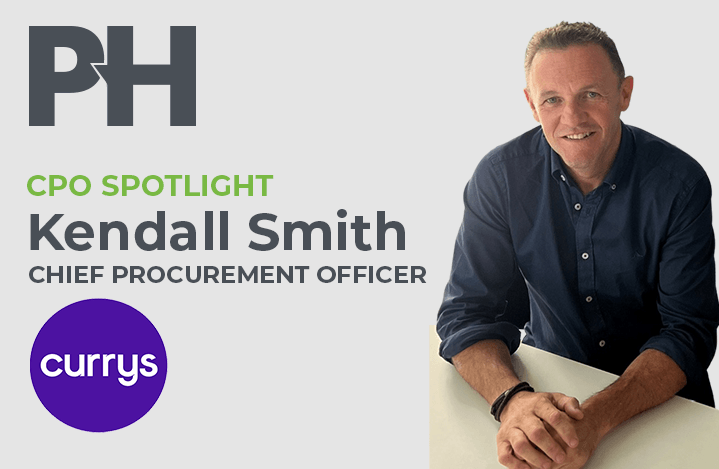For Procurement Heads‘ latest instalment of our CPO Spotlight series, she spoke with Rupert Gaster about her career and procurement’s role in sustainability.
Could you tell us about your journey to becoming Executive Director at BC Ferries?
I went to university planning to become a Diplomat, then in the second year I found myself in supply chain work, and I just fell in love with it, especially contracts negotiation.
Back then I was responsible for a large portfolio of international suppliers and it was fascinating to me.
At the beginning of my career, I was in a large manufacturing environment and one of the things I enjoyed the most was going to the floor to see the processes and the logistics surrounding how we would deliver products.
That made me very passionate about the supply chain.
The art of ‘diplomacy’ has served me well when dealing with different stakeholders across the organisation and trying to steer them in the right direction.
Throughout my career I have had the opportunity to work in various industries, including public organisations in Canada, and with companies that were either hybrid or private with high scrutiny.
That is something that really appeals to me in terms of compliance, and risk management, making sure that we have robust governance to cover all aspects of the business.
BC Ferries is a hybrid company under contract to the Province.
We are the service provider responsible for the delivery of safe and reliable ferry service along coastal British Columbia.
We own all of the vessels, while all the terminals belong to the provincial government.
Therefore there is a strong partnership between BC Ferries and the government with one common goal: to serve our communities.
The opportunity to join BC Ferries was very appealing to me since it has ambitious environmental and sustainability goals.
I envisioned a huge opportunity as a practitioner in the supply chain and procurement arena to make a difference and help the organisation to achieve those goals.
I think we have a lot of impact in the environment here and a lot of opportunity to make changes and be leaders which was very exciting.
How did it feel to be recognised in the CPO Strategy’s Sustainable Procurement Champion’s index?
I was thrilled to be acknowledged. I worked with CPO Strategy on a publication back in 2020.
They reached out asking about BC Ferries and what we are doing in the sustainability space, and we had a great conversation on that topic.
Then I shared with them some of our key initiatives and the key objectives of the supply chain roadmap, along with the sustainability framework and the elements associated with how we are going to support the organisation in reaching its sustainability goals.
When I saw the publication I was so happy to see my name among other individuals who I know are doing serious work in the sustainable procurement world.
It was an honour.
You are the Co-Chair of the Sustainable Procurement Pledge, an organisation we support, what does your role entail and how do you help spread the message?
I joined the Sustainable Procurement Pledge (SPP) and became a Co-Chair in the public procurement chapter because I truly believe that the public sector has a lot of influence over how we impact our communities and how we impact the environment.
Governments around the world spend trillions every year buying goods and services.
The Public Procurement Chapter did some research and found out that the EU alone has more than 2,500 public authorities spending 14% of GDP which was around 2 trillion Euros per year.
In Canada, companies will spend around $700-800 billion buying services and goods each year.
That portrays the immense bargaining power we have and the power to influence how we select our partners.
My role at the SPP is not only to publish articles about sustainability, but it is to influence change by spreading that message.
That goes beyond my organisation, beyond my network, by utilising the powerful channels we have to propagate that message while promoting significant change.
It’s about creating value for our people and our planet, and by ensuring that we understand how government, legislation, and policies across the world address and embrace the challenge of sustainability and emerging social values.
One of the things that we have been doing is holding quarterly webinars.
It has been a very interesting journey involving representatives from several countries, asking the same question every time, ‘What is hindering the progress of sustainable procurement practices in your organisation?’ The answers are often the same: lack of policies supporting the change, lack of procurement practitioners’ capacity, training and tools, lack of understanding from stakeholders within the organisation resulting in a lack of buy-in.
These are some of the key issues we see across the globe.
So, we are empowering people and sharing good practices on how they can overcome those obstacles so that we can accelerate the change that we want to see.
What role has procurement played in reducing your carbon footprint at BC Ferries and how are you going about future-proofing that with sustainability?
Sustainable procurement is not about what I do in my department, but how my department supports the organisation.
We see that disconnect in some organisations.
BC Ferries has a very aggressive goal to decrease our 2008 emissions levels (baseline year) by 27% by 2030, so what we are doing is working with a few elements to achieve that.
Fleet replacement is one, with plans to replace seven major vessels with the first ship scheduled to enter service in 2029.
We are exploring the potential of alternative sources of energy for our vessels that will shape design decisions.
We recently added six battery electric hybrid vessels, running cleaner than traditional diesel ships, with the potential of converting to fully electric operation.
Electrification can play a vital part in reducing GHG emissions in ferry operations.
The SCM (supply chain management) team is working very closely with the environmental team and the shipbuilding group ensuring we provide them with the support they need to make all these decisions.
Why does BC Ferries place such an emphasis on sustainability?
Because we serve our communities, connecting people with places across our Province, that’s our main business.
While we do that, if we are not taking measures that focus on preserving our marine life, the wildlife and how we reduce emissions then we are not serving our communities with a forward-looking approach.
Ninety-eight per cent of our emissions come from our vessel operations, therefore if we don’t do anything about how we power them or build them then we are going to be continually looking at the status quo.
We are diligently working on five areas to reduce our emissions:
- Using renewable and alternate fuels (such as renewable natural gas, renewable diesel and biodiesel)
- Electrification
- Operational efficiencies;
- Advanced technologies
- Fleet modernisation
We are also always looking at all operational efficiencies and all sorts of advances in technology.
Together these components will contribute to our goals on the road to net zero.
We have a clear path, and we are working hard to get there.
Your motto is ‘We want to be a trusted and valued partner, connecting communities and customers to people in places that are important in their lives’ how does that input into your team?
Ensuring we have reliable services to serve communities, starts with how we select our partners.
I say partners very meaningfully, as I believe that having suppliers is very different from establishing partnerships.
The distinction I make is that suppliers are the ones you rely on to give you parts and equipment when you need them. Your partners are the ones that are with you in bad and good times.
We have been working hard to improve our relationship with our suppliers.
You’ve probably heard many times ‘we just hear from you when there is a problem’.
We don’t want this to happen.
A partnership is having continuous conversations, inviting suppliers in the early stages of projects to brainstorm solutions and see what kind of innovations they may have on their roadmaps that they can share with us so we can align and work together towards a more sustainable way of delivering services.
Part of that is establishing a vendor performance program to meet with Suppliers on a consistent basis.
We are developing a framework to implement a formal VPM (vendor performance management) next year that will start with our tier-one vendors.
The goal is to establish a consistent method to measure performance and establish a conversation throughout the year with our suppliers to strengthen partnerships.
Where do your passions lie day-to-day?
First of all, people.
I love people, work very closely with my team, and try to connect with them personally.
I learn through consultation with my people and stakeholders, and I choose to rely on in-house knowledge.
At BC Ferries specifically, people stay for many years (which speaks highly of the culture of the organisation), therefore you can absolutely not miss the opportunity to collect the vast knowledge of internal stakeholders.
Then, process automation.
My focus is to establish smooth processes and identify things that can be removed (non-value-add activities).
Where there is wait, there is waste.
If you can’t identify the value of any given activity, then those need to be removed.
These can be achieved by process improvements or simple automation on given processes.
Sustainability is another of my big passions as you know, and I want to be careful because one thing I don’t want to see happen with sustainability is for it to become another buzzword.
We all must take meaningful steps to accomplish what we have to accomplish and not speak about sustainability in a way that loses its meaning.
What is next for procurement and supply chain at BC Ferries?
I would say a big focus for us is our planned major vessels programme.
We have earmarked more than $1 billion in our capital spend. The first new major vessel is set to enter into service no later than 2029, currently tagged for 2026.
We also have a robust roadmap where we are looking into a bunch of activities that support the organisation’s goals on various fronts.
BC Ferries was recognised for its environmental leadership with two awards in 2021 – the Blue Circle Award by the Vancouver Fraser Port Authority and the Green Wave Award by the Prince Rupert Port Authority.
We have also been a member of Green Marine since 2014, which is a voluntary environmental certification program for the North American marine transportation industry.
We want to continue with the pattern of winning awards, voluntary environmental stewardship, and making a difference!
We have a lot of work to do and we want to make sure that we are not only meeting our goals but also surpassing them.






